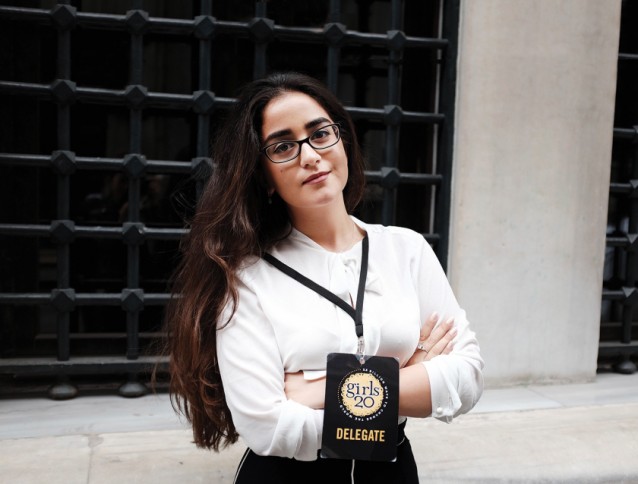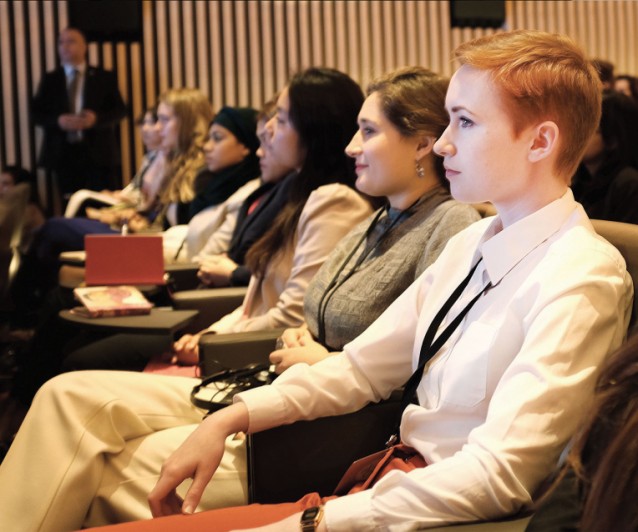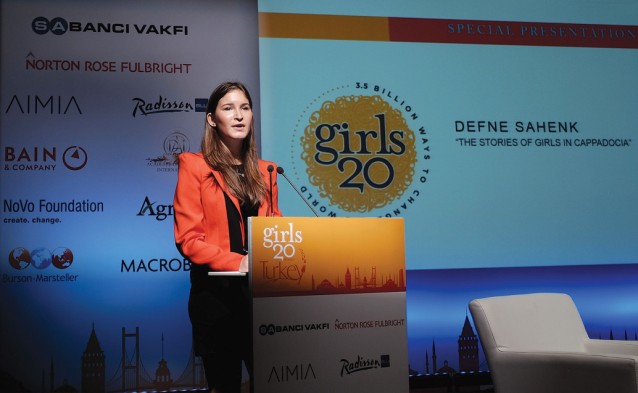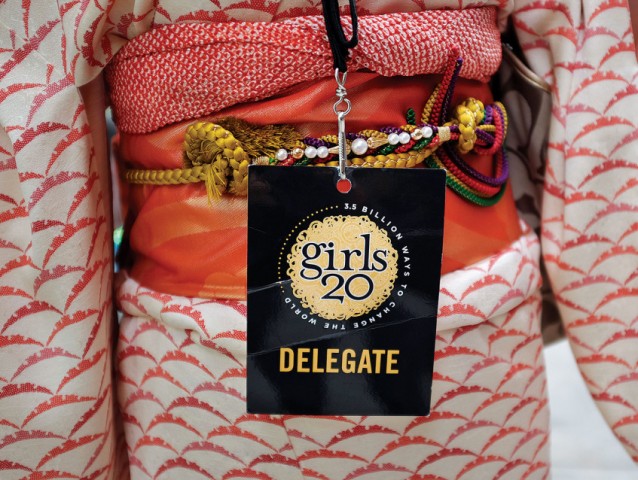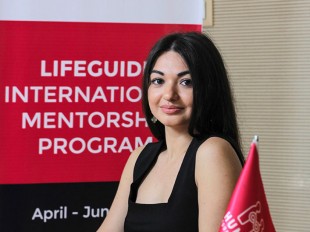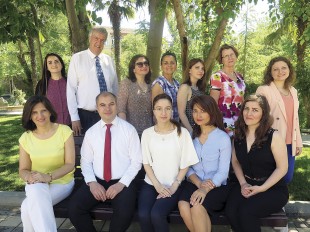The G20 is a group of states representing the world’s leading economies that meet regularly to discuss political and economic issues extending beyond state borders. The 10th meeting of the G20 heads of government was held in November in Antalya, under Turkey’s presidency.
Prior to that meeting, in October in Istanbul, the 6th G(irls)20 Summit took place. The participants were girls aged 18-23, one delegate from each G20 country, plus a representative from the European and African Unions, the Middle East and North Africa region, Afghanistan and Pakistan. Given Turkey’s presidency of the upcoming G20 Summit, delegates from Azerbaijan, Singapore and Spain also joined this year’s G(irls)20.
Despite her youth (she is just 18) Ismet Jahangirova was lucky enough to be the first Azerbaijani delegate to a G(irls)20 Summit. Currently a 2nd year student at the Azerbaijan University of Architecture and Construction, Ismet is on the way to realising her childhood dream – to become an architect. To find out more about the summit and to learn more about Ismet’s own plans, Narmin Mahmudova met her in our Baku office.
The main reason we gather as girls is to draft a communiqué which has suggestions or demands or advice that we give to the G20
VoA - Ismet please tell us what G(irls)20 is about.
IJ - Some people think that G20 and G(irls)20 are the same, but they are absolutely not, the G20 comes after Business20, Women20 etc. G(irls)20 is always before the G20. The main reason we gather as girls is to draft a communiqué which has suggestions or demands or advice that we give to the G20. There are about 15 different pieces of advice from completely different spheres.
15 pieces of advice from each of you?
No, we were 27 girls and we discussed everything together. We were divided into groups, so it was group work. You can’t say to G20 leaders you want women to participate more in the life of the country just because we want women to be equal with men. That’s not what the G20 leaders want. No, we want this because it would bring some economic benefit. It is more about the benefit – what this will be good for.
Which group did you join?
I went to the education group.
Please tell us a little about yourself, how did you come to be selected for the G(irls)20 summit?
Actually, it [G(irls)20 – Ed.] isn’t very well known, I was the first delegate from my country. It was my aunt who told me about it. I applied through the internet - that wasn’t very hard. But then you have 500 interviews, then you have 500 other things to do! So that was all pretty complicated.
Had you been involved in women’s issues before?
Well, the first reason I went there was that I wanted to represent my country. You go there and you say, these are the good points we have, these are the bad ones; help us to solve them. They give good advice and I made useful contacts with people from all over the world. They are all interested in doing things for people.
Azerbaijan is not a member of the G20, as we know.
Yes, but there weren’t only these 20 girls. There were girls from the G20 countries plus 7….
Can you tell me about yourself, where do you study?
I’m studying here, at the Architecture and Construction University. What I do is mostly architecture, I have no connection to human rights or law. There was me and another girl from Spain studying fine arts, so we were the only ones with no human rights background.
So, why do you think they chose you?
I don’t know (laughing). Well, maybe because by the time I went there they already knew so much about me. Before you go there you write so many tests, essays, CV... they know me even better than my mother does, I guess. They are looking for people who want to come back and do something.
When they selected you, did you have a special programme, or how did you prepare?
Yes, they give you a handbook and draft agenda - what you will do at the summit, everyday, minute by minute. They give you a lot of resources to read; one of the resources was about 340 pages, mostly about the gender gap.
What were your goals for the event?
Actually the gender gap is everywhere. My idea is to start from education, because, for example when kids are small they don’t have any gender gap. Girls run and fight just like boys, but then they go to school, they learn a lot about themselves and they become a little bit different than they were before. So I think we should start from primary education, it all starts there basically.
How are you going to do that?
It’s not as complicated as people think. I met one woman at the summit and she said exactly what I felt: First you have to train the parents, then the children, because they are their children’s first teacher.
You try to involve parents in this process. For example, in Istanbul they have Sabanci Vakfi, which actually does a lot for Turkey and doesn’t profit much itself. It’s located in Tarlabashi, a very poor place in Istanbul. In just one building where a couple of women work, they’re providing education for kids of any age. They tell fathers to come to lessons with their daughters, so they see that nobody is going to kidnap them, they are just studying. So after a while the father is ok with the idea and he brings other daughters to the school.
Can you tell us a little about the summit. What did you like most, what didn’t you like, what benefit did you get from the summit?
There are only two days of the actual summit. First you have preparation, you have workshops everyday. You get up at 6am and go to the Google office to work. We had very good workshops with Google themselves. There were other big companies who shared their experience of what they were doing about the gender gap in their companies; they were all heads of companies.
We met Turkish women, for example, the Director of HP. Each workshop had its own purpose - how to help you with the summit, how to talk to speakers, what you should be focused on, etc. They actually help you to understand yourself, what you could develop in your country and how. They give you real tools, they talk about leadership.
There were seven days of workshops, a two-day summit and one day for the communiqué. The summit was mostly with the speakers, who were all absolutely amazing.
Who were the speakers?
Some were heads of companies. For example, Ece Vahapoglu, a very famous woman in Turkey. She works on television, and she is a role model in Turkey. So, they brought successful people to tell us: I wasn’t anything before, but you can be something. You can always be better than us, and this is how we can help you.
There was Amanda Lindhout, she was kidnapped in Somalia (and held) for about 15 months. She wrote a book about it all. So they all told their stories and after that there was time to discuss. We asked questions, told them our own ideas and they helped, like that.
So, from your point of view, what makes the ideal or perfect woman?
Before I went there, I knew about the girls I would be with. But there you spend so much time together, you get to know them better. For example, there was a girl from Ireland, I have never seen anyone aged 18 so politically aware of the situation in her country. If I were in her government I would hire her to work in my company or for my country as a politician for sure.
So that’s how I want to see people. Sometimes people think feminism is about hating men; it’s absolutely not. So when the head of a company tells you, I’m not taking you, I’m taking someone who has lower qualifications than you just because you are a woman, I think he has a problem. This isn’t about me, I would never take it personally. I have never actually faced things like that. People think that we are from an eastern country and that we face this every day in Azerbaijan. No we don’t, but we should start from things like education. What I see in the future is women working and building their lives just like men, because when you have a mother who is well educated, you have educated kids.
Just be the person you want to be, study what you want, if you don’t want to study, then don’t
Like Taghiyev* said: If you educate a boy you educate one person, if you educate a girl, you educate a family.
Yes, that’s true. Some feminists from other countries don’t agree that a woman should do all the work in the family, the man should stay with her and take on the childcare etc. I’m not strict about such questions, you shouldn’t insist on - it depends whether you’re a girl or a boy, that’s why you do it. Just be the person you want to be, study what you want, if you don’t want to study, then don’t.
[*Zeynalabdin Taghiyev was a famous entrepreneur, philanthropist and oil magnate in late 19th, early 20th century Baku - Ed.]
So do you consider yourself a feminist?
I don’t consider myself as anyone. I don’t like the gender gap. I can’t say I’m against men or for women, I’m just someone in the middle.
So, what are your plans for the future? What career plans do you have?
Well, my career plan is to be an architect! (laughing)
And fighting for women?
I don’t want to concentrate so much on that - when you always talk about the gender gap, it starts happening. You should remove it, but remove it quietly. You shouldn’t shout about it. You should try to fix it, but gently. Because when you shout about it, men get angry. They say: Ok, I‘m working for five people and you tell me that I don’t respect women? I think if everyone does their own work well, everything will be fine.
How can this be done here in Azerbaijan?
In some countries, they have lessons in school - Social Living Rules or something about social life - and it starts from the 1st grade. There shouldn’t be so much focus on it [the gender gap – Ed.]. It might be just a lesson about living in the world, what are the good things, what are the bad things…. Tell girls - You can be successful, you can do this, you can do that, you should be educated, or, maybe you shouldn’t be educated, it’s your choice.
There are two places where you find your role models: at home or at school. When you educate one generation and they become parents, you don’t need so much effort, because they will educate their kids normally. That’s my point.
Why do you want to be an architect? Where did that come from?
That was my dream job. I thought about it when I was in the 3rd or 4th grade. I’m more interested in being a civil architect, in building cities, country houses, construction. There is so much to do in my city.
How should this be done?
You should respect history, work properly on reconstruction and when you build something new, there should always be – as we say in architecture language – a symphony. You have a neighbourhood, for example, and the buildings should be related to each other. If you build something new in the middle of the neighbourhood I don’t think it’s right. You shouldn’t think of the land, you should think of what is around it. For example, the Four Seasons [hotel – Ed.] was built properly - they should work in this way.
Who are your architectural heroes?
Well my architectural hero is from our national architecture, Mikayil Huseynov. I’m very interested in the projects he didn’t realise. I would be very happy to find them and, I can’t say make them modern, but we could use these projects in the regions. He was amazing. For example, the Dom Soviet building [Government House in baku - ed.] wasn’t his, but he had his own project for that, we could still use it.
When you have a mother who is well educated, you have educated kids
What is your favourite project here in Baku? And in the world?
I’m very inspired by my own city, but I’m really in love with Turkish architecture. The Sultan Ahmed Mosque, the Haghia Sophia, they are about combining the old and the new - I love oriental architecture. I think we should take the national elements we have and combine them with something modern, which is, actually, what Mikayil Huseynov did. When he was allowed, he had a national angle to his work.
What do you think about Zaha Hadid? [the architect of the Heydar Aliyev Centre – Ed.]
I think I would like to work on her architecture. She works in London sometimes, and she has a lot of young people working with her.
So you like the Heydar Aliyev Centre?
Yes, I do. What I like about it is that everything you have outside you also have inside. It’s all very connected. Because sometimes we have a building that is very beautiful outside but it’s very different inside. She made it as interesting inside as outside. And that’s pretty hard to do….
With that, we left Ismet to think more about her G(irls)20 experience, and to return to her architectural studies. One way or another, we guess she will have a say in the country’s future! You can read the G(irls)20 communiqué here: http://is.gd/zTmMli
About the author: Narmin Mahmudova is a young writer with a particular interest in women’s issues.
